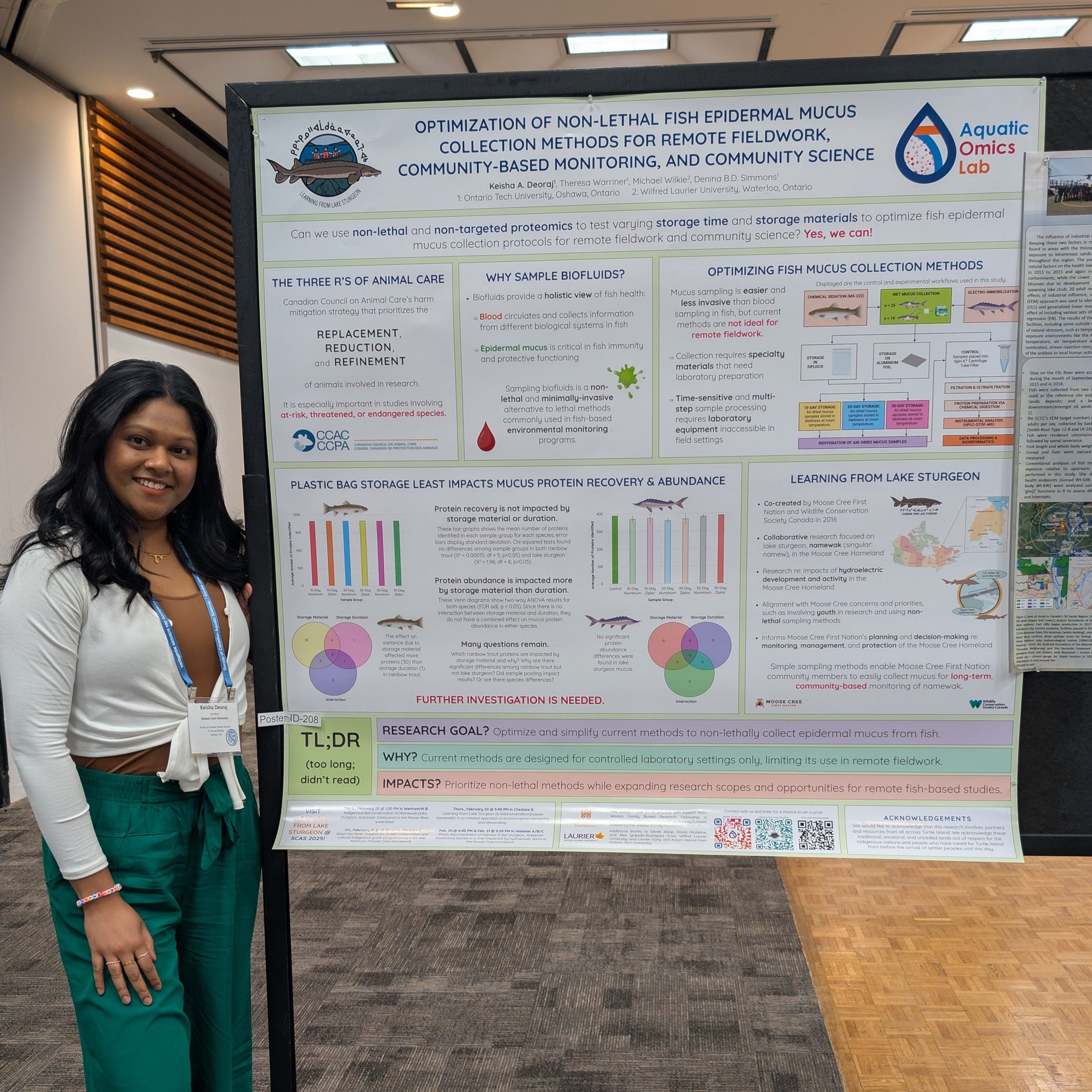BRINGING KNOWLEDGE TOGETHER AT SCAS 2025
Bringing Knowledge Together at SCAS 2025
At the end of February, the Learning From Lake Sturgeon (LFLS) team attended the Society of Canadian Aquatic Sciences (SCAS) Conference in Hamilton, and wow—what a gathering! This wasn’t just any academic conference. For our team, it was a space where youth, community members, and researchers came together to share knowledge, stories, and ideas about protecting our waters. We did things a little differently—co-presenting, bringing in Indigenous Knowledge, and showcasing one of the strongest methods to conservation: working together.
Pictured: (Top Row - Left to Right) Anjum, Haley, Allison, Nina, Keifer, (Bottom Row - Left to Right) MacKenzie, Avery, Claire, Keisha
Not pictured: Kelsie
Changing the Way We Share Knowledge
Most academic conferences follow a pretty standard format—one person stands up and presents their research, usually through a Western science lens. But that’s not how we see things. Conservation doesn’t happen in isolation, and knowledge comes in many forms. At SCAS, we embraced co-presentation, where youth, researchers, and community members stood side by side to share their work. We made space for Indigenous science and ways of knowing alongside Western science, and it was powerful!
Our Team’s Contributions
So many amazing voices from our team helped make this event special! Here’s a look at what we shared:
Western & Indigenous Science Youth Programming Kit Aski Nahnuun (Moose Cree Homeland)
Our team members Claire, Allison and Kelsie, alongside two2 youth representatives from the Learning from Lake Sturgeon youth committee, Keifer Hester and Mackenzie Taylor, presented about the project’s history of youth programming: combining conservation and cultural learning and experiences. Our youth presenters stepped up in a big way, sharing their experiences and insights – particularly about the Neemamo Mishkanan (We Canoe Together) program.
“The program allowed us to participate in traditional ceremonies and learn about scientific initiatives that go into studying our water and sturgeon,” says Keifer Hester, who is one of our incredible youth committee members. He added “I gained a newfound respect for our land and water, which is why I joined the youth advocacy committee after the canoe trip—to work towards expanding and creating opportunities for our youth and be a part of the advocacy for our land stewardship.”
Our group celebrated a job-well-done with other youth committee members Rae Corston and Avery Taylor at a pizza dinner.
Indigenous-Led Conservation and Partnerships in the LFLS Project
Our team members Haley, Claire, and Kelsie provided a deep dive into how the LFLS project is being shaped by Indigenous leadership, not just as contributors, but as decision-makers. They talked about how scientific research practices such as acoustic telemetry and sampling, coupled with Indigenous Knowledge from community members and Elders, are equally valued as tools to learn from namewak.
Photo-Scoring of Namewak Poster
Anjum shared key findings from photos taken of 83 sturgeon from four sites within the Mattagami River and North French River between 2016 andto 2024. The results showed that namewak in the Mattagami River—where hydroelectric development has shaped the landscape—had more visible injuries compared to those in the North French River. Anjum highlighted how photoscoring can be a powerful, accessible tool for communities to monitor the health of namewak populations and track the ecological impacts of hydroelectric dams. This approach could empower local community members to actively participate in conservation efforts by documenting and analyzing changes in their own waterways.
Non-Invasive Fish Health Monitoring (Keisha)
Led by Keisha Deoraj, this project showcased that instead of common sampling methods, fish mucus can tell us a lot about their health without harming them. Mucus samples can be air-dried and stored in plastic bags or aluminum foil for up to 30 days. This research is part of a broader initiative to improve non-lethal mucus collection for remote fieldwork and community-based monitoring.
Keisha showcasing her poster on non-lethal and non-targeted proteomics to test varying storage time and storage materials to optimize fish epidermal mucus collection protocols for remote fieldwork and community science.
Special thanks to Derek Alsop, David McAlpine, and Alex Quijada-Rodriguez from Wilfred University, and Lauren Song and Anjum Hamid from Ontario Tech University for making this research happen.
Welcoming Friends from Afar
Researchers and collaborators from across different regions joined us at SCAS, reinforcing the importance of shared learning and partnerships. Dr. Gretchen Lescord of the University of Florida made the trip all the way from Florida, and Dr. Denina Simmons of Ontario Tech University also attended, both contributing to meaningful conversations and strengthening our collaborative network.
A Team Effort
Even though Connie O’Connor of WCS Canada and Jennifer Simard of Moose Cree First Nation couldn’t make it, their work was still very much a part of our presentations and discussions. We carried their voices with us.
Why This Matters
Events like SCAS remind us why we do what we do. This isn’t just about science—it’s about our relationship with the land and water. It’s about ensuring that Indigenous voices aren’t just invited but are leading the conversations. It’s about making space for youth and showing that their knowledge matters just as much as anyone else’s.
A huge thank you to everyone who made this possible—our presenters, community members, academic partners, and supporters. This is just the beginning!
Until next time, let’s keep learning, sharing, and protecting our waters—together.










